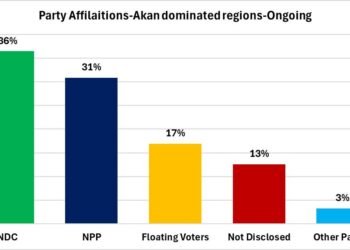An Adentan Circuit Court has ordered the arrest of a 32-year-old trader who was found in possession of 200 pieces of fake GH¢ 5.00 notes.
Patience, who was on Police enquiry bail, was absent without any notice to the court when the case was called. The Prosecution led by Chief Inspector, Jacob Nyarko, prayed the Court for a bench warrant for the arrest of the accused. Subsequently, the Court, presided over by Mrs Sedinam Awo Balokah, obliged to the prosecutor’s request and issued the arrest warrant.
According to the fact sheet, the complainant is a mobile money vendor residing at Oyarifa, while the accused also lives at Owusu Ansah, a suburb of Oyarifa. On August 14, Patience Mettson, the accused, went to the complainant’s shop at about 8:30 pm to deposit an amount of money, totalling GH¢ 1,000 (200 pieces of GH¢ 5.00 notes) into her mobile money wallet. However, the vendor upon assessing the money, realised that the five Ghana cedi notes were fake. He swiftly apprehended Madam Mettson and sent her to the Police station, after she failed to answer any of the questions the complainant asked.
The prosecutor stated that the accused admitted having the fake notes, nonetheless denied knowing that they were fake. Madam Patience was since charged with possession of fake currency.
Chief Inspector, Jacob Nyarko, indicated that the exhibits were sent to the Bank of Ghana for examination, where it was confirmed to be fake notes.
The Court, however, adjourned the matter sine die, meaning proceedings have been adjourned with no appointed date for resumption. The court noted that whenever the accused person is arrested, she should be put before Court.
Counterfeiting Under the Laws of Ghana and the Punishment
According to the laws of Ghana, forgery, uttering or possession of forged notes is an offence and punishable by law. A section of the constitution is as follows:
(1) A person commits a first degree felony if that person, with intent to defraud, forges a note, or utters a forged note.
(2) A person who without lawful authority or excuse, purchases or receives from any other person, or has custody or possession of a forged note knowing the note to be forged, commits a second degree felony.
(3) The Court convicting a person under subsection (2) may impose a term of imprisonment less than three years or a fine not exceeding seven hundred and fifty penalty units or both the imprisonment and the fine if satisfied on grounds stated below:
(a) That the offence was trivial, or
(b) That there are special circumstances relating to the offence or the offender which would render unjust the application of the minimum penalty prescribed by subsection (2).3(3).
Incidents of Counterfeits on the Rise
Recently, five persons have been arrested by the police in a hotel at Dansoman in Accra, with wads of counterfeit foreign and local currencies. The police found 108 wads of fake dollars, a wooden box containing 34 wads of fake CFA and a number of GH¢200 notes suspected to be counterfeit, with some white powdery substance on them and concealed in an ice chest.
It can be recalled that another notorious counterfeit baron was also arrested at Gomoa Buduburam in the Central Region of Ghana. The 43-year-old was apprehended after several complaints by residents at Kasoa, Budumburam and its environs that some group of people were trading in fake currency.
However, the Vice President, Dr Bawumia, in his public address at Ashesi University, averred that the e-Cedi will reduce incidence of fake currencies.
“The e-cedi is simply the digital form of the physical cedi in circulation. It is a legal tender issued and backed by the central bank. With the digital currency, citizens and residents both the banked and unbanked will hold currency in the form of a digital wallet. When implemented, the incidence of fake or counterfeit currencies and bullion van robberies will be drastically reduced.”
Dr Bawumia

READ ALSO: Poorly-run Businesses Threaten Viability of the Banking Sector- Deputy BoG























